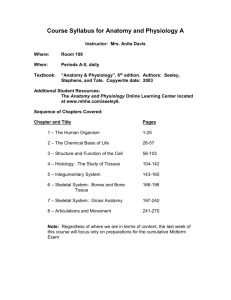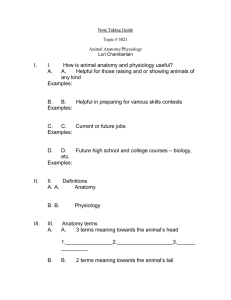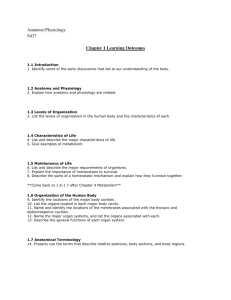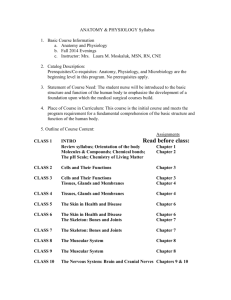1. Briefing endocrine system
advertisement
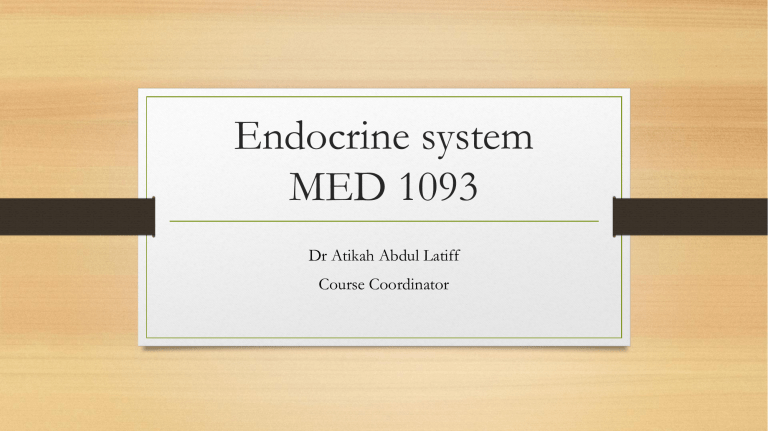
Endocrine system MED 1093 Dr Atikah Abdul Latiff Course Coordinator This briefing aims to cover: • • • • • • • Course introduction Lecturers involved Assessments – topics and marking system Overall learning objective References Attendance Expectations Course introduction • Course code: MED 1093 • 4 weeks; 3 credit units • 120 notional hours • Course coordinator: Dr Atikah Abdul Latiff Lecturers involved • Anatomy: Dr Atikah, Dr Reshma, Dr Sara and Dr Saheera • Physiology: Prof Hamdan, Dr Hafiz, Miss Mun Yee • Pathology: AP Dr Nani, AP Dr Thuaibah, Dr Bushra, Prof Noor Aini • Pharmacology: Dr Jahid Mode of teaching/learning • Interactive lectures (IL) • Student Centred Teaching Learning (SCTL) • iRAT and gRAT in physiology modules • Anatomy lab (dissection hall and learning resource centre) • Physiology case studies • Problem based learning (PBL) Assessments 1. Continuous assessment 30%: • mid-course assessment (single based answer questions- SBAQ only) (20%). • Quiz (IRAT & GRAT) (5%) • Case studies on physiology of endocrinology system (2%) • Peerwise & AROPA (1%) • Anatomy lab report (2%) 2. Final exam comprises 70% of the final marks. Includes SBAQ & short answer question (SAQ). Overall learning objectives At the end of the block, you should be able to apply the knowledge of anatomy, physiology, pathology, biochemistry, microbiology, radiology and pharmcology to describe the core diseases of the endocrine system namely; • • • • • • • • • • Hypo/Hyperpituitarism Gigantism / Acromegaly Diabetes Insipidus & SIADH Diabetes Mellitus Hypo/Hyperthyroidism (Myxoedema/Cretinism) Hyper/Hypo Parathyroidism Hyper/Hypo Cortisolism Cushing’s Disease/Syndrome & Addison’s Disease Phaeochromocytoma Stress Related Diseases Anatomy References • Keith L. Moore, Arthur F. Dalley, Anne MR Agur. Clinically Oriented Anatomy, 7th Edition, 2014. Lippincott, Williams & Wilkins • Thomas W. Sadler. Langman’s Medical Embryology, 13th Edition, 2015. Lippincott, Williams & Wilkins. • Anthony Mescher. Junqueira’s Basic Histology: Text and Atlas, 14th Edition, 2015. McGraw-Hill Medical. Physiology • Patricia E. Molina, Endocrine Physiology, 4th edition, 2013. The McGraw-Hill Companies, Inc. N.Y. • • • • • Additional references supporting the course Anatomy Richard S. Snell. Clinical Anatomy by Regions, 9th Edition, 2012. Lippincott, Williams & Wilkins. Frank H. Netter. Atlas of Human Anatomy, 6th Edition, 2014. Saunders. Anne Gilroy, Brian MacPherson, Lawrence Ross, Michael Schuenke, Erik Schulte, Udo Schumacher. Atlas of Anatomy, 2nd Edition, 2012. Thieme New York. • Physiology • Kim E. Barrett, Susan M. Barman, Scott Boitano, Heddwen Brooks, Ganong’s Review of Medical Physiology, 23e, The McGraw-Hill Companies, Inc. 2010 Attendance • Attendance is compulsory to all timetabled slots • Failure to attend more than 10%: warning letter • Failure to attend more than 20%: barred from exams • All non-attendance will need a show-cause letter written to me or in cases of health related non- attendance, please provide a valid MC to me Expectations • Enjoy the course as it is an integration and application of previous knowledge • Get to know more about PBL (Problem Based Learning) and prepare for it → only then will you enjoy it! • Complete assignments well to secure ‘free marks’ before finals • Be punctual to not miss important learning experiences • Overall, I hope you will all sail through, have an enriching experience and PASS with flying colours! Best of Luck! ☺ If anything, do not hesitate to email me: atikah@cybermed.edu.my
